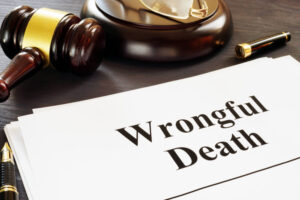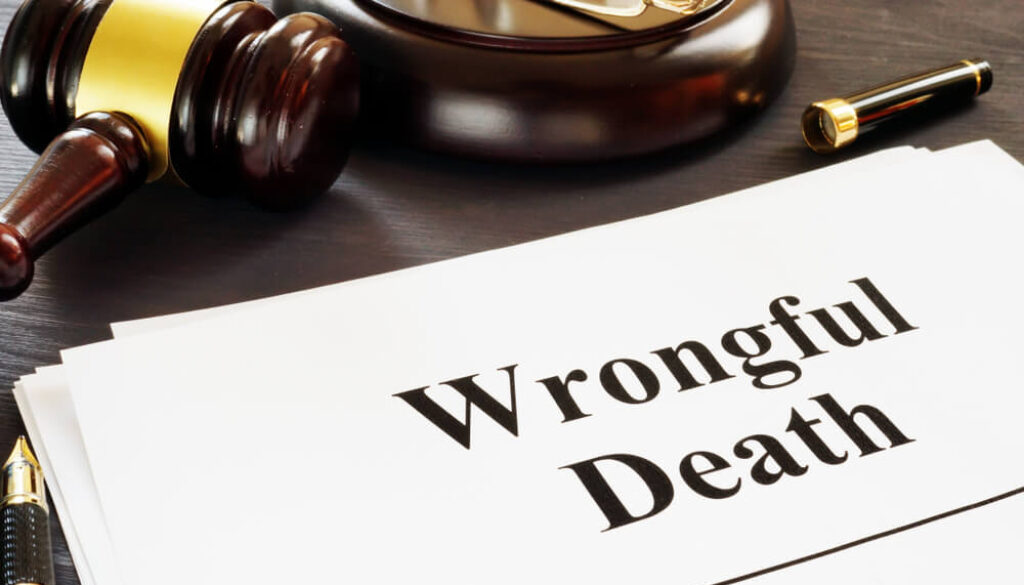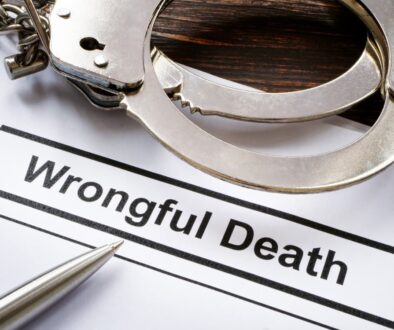What is a Wrongful Death in Oklahoma?
Losing a loved one is always difficult. Sometimes, this tragic loss happens due to someone else’s mistake or wrongful conduct. When this happens, the law deems it a wrongful death.
Following a wrongful death, close family members have important legal rights. If you are in this devastating position, seek a free consultation with a compassionate Tulsa wrongful death attorney.
What Does Wrongful Death Mean?
Wrongful death happens when someone’s actions, or failure to act, cause another person’s death.
This can happen in different ways:
- Vehicle accidents: Many wrongful deaths happen because of car, truck, or motorcycle accidents. For example, if a driver isn’t paying attention and causes a car crash that leads to someone’s death, this can constitute wrongful death.
- Property-related accidents: A fall from a high place, elevator accident, swimming pool drowning, and other fatal incidents due to property hazards can result in wrongful death.
- Criminal acts: In cases where someone is intentionally harmed and dies, like in cases of domestic violence, this can also lead to a wrongful death claim in addition to criminal charges.
Many other examples of negligence or wrongdoing lead to wrongful death. Never assume you do not have a case; allow a wrongful death lawyer to evaluate what happened and your options.
How Does the Law Help?
 The law gives families a way to seek help when they lose someone to wrongful death.
The law gives families a way to seek help when they lose someone to wrongful death.
Here’s how it works:
- Financial support: One of the main ways the law helps is by allowing families to ask for money to cover expenses related to their loss. This can include medical bills, funeral costs, and lost income.
- Holding people accountable: Wrongful death claims can also make the person or company responsible face the consequences of their actions. This can prevent similar things from happening to others.
- Closure and justice: For many families, a wrongful death claim is about finding some closure and a sense of justice. It acknowledges that what happened was wrong and that the family deserves support.
What’s Involved in a Wrongful Death Claim?
Filing a wrongful death claim involves a few steps:
- Gathering evidence: To prove wrongful death, you need evidence. This can include photos from an accident, medical records, or witness statements.
- Legal process: The procedural process for wrongful death claims involves filling out claim forms, negotiating with insurers, possibly filing a lawsuit in civil court, meeting deadlines, and sometimes going to trial.
- Understanding the law: Each state has its laws about wrongful death. These laws say who can file a claim, what they must prove, and how much time they have to start a claim.
Close Family Members and Wrongful Death Claims
Most of the time, the people who can file a wrongful death claim are the closest family members of the person who passed away.
Here’s a closer look at who these family members usually are:
- Spouses: If the person who died was married, their husband or wife can usually start a wrongful death claim. This is because spouses often depend on each other for financial support and emotional comfort.
- Children: The children of the person who died, whether they are minors or adults, can also file a claim. For children, the loss of a parent means losing not just love and care but sometimes financial support as well.
- Parents: If the person who died was a child, their parents can file a wrongful death claim. This is especially true for parents who lose a minor child, as the emotional impact is often very severe.
Understanding State Rules
Each state has rules about wrongful death claims. These rules tell us who exactly can file these claims. For example, in some states, brothers and sisters, or even grandparents, can file a wrongful death claim if they are very close to the person who died. In other states, the rules might be different.
What About Partners and Other Relatives?
Sometimes, people who were very close to the person who died, like a long-time partner or a stepchild, might wonder if they can file a claim. This can depend a lot on the state’s rules. In some places, if you can show that you were financially dependent on the person who died, you can file a claim.
The Role of Personal Representatives
Sometimes, the law might allow a personal representative of the deceased person’s estate to file a wrongful death claim. This person is chosen to manage the estate and can act on behalf of the family in legal matters, including filing a wrongful death claim.
Time Limits for Filing a Claim
Remember, there’s a time limit, known as a statute of limitations, for filing a wrongful death claim. This means you have a certain amount of time after your loved one’s death to start the legal process. These time limits can vary a lot from state to state.
What Does a Wrongful Death Claim Include?
We’re looking at a few things when discussing a wrongful death claim. These claims can help cover costs like:
Medical Bills Related to the Person’s Final Injury or Illness
This includes all the costs of medical care that the person received because of the injury or illness that led to their death.
Funeral and Burial Expenses
These are the costs associated with laying a loved one to rest, including the funeral service, burial, and related expenses.
Lost Income, Especially If the Person Who Died Was a Main Provider for the Family
This reflects the financial support the family loses because the person who died can no longer contribute to the household income.
The Pain and Suffering the Person Went Through Before Passing Away
This addresses the physical and emotional distress experienced by the person who died as a result of their injury or illness.
The Loss of Love, Companionship, and Guidance, the Family Feels Because of the Loss
This covers the emotional and relational impact on the family due to the absence of their loved one.
Settlements and Court Cases
When a family loses a loved one and decides to file a wrongful death claim, the case can end in two main ways: through a settlement or a court case. Let’s talk about what these mean and how they work.
Settling a Wrongful Death Claim
A settlement is when both sides in a wrongful death claim agree on a deal without going to court.
Here’s a bit more about how settlements work:
- Reaching an agreement: In a settlement, the person or company is considered responsible for the death, and their insurance company usually agrees to pay a certain amount. This avoids the uncertainty and costs of a court trial.
- Negotiation: Before you reach a settlement agreement, there’s often much talking between the two sides. A lawyer works with the other side to agree on a fair amount. They think about things like medical costs, lost income, and the emotional pain the family is going through.
- Finalizing the settlement: Once both sides agree on an amount, the settlement is written. After it’s signed, the family receives the agreed amount of money, and in return, they usually agree not to take any more legal action on this matter.
Going to Court for a Wrongful Death Claim
Sometimes, you cannot reach a favorable settlement. When this happens, the case might go to court.
Here’s what that involves:
- Preparing for court: Going to court means preparing a lot of evidence to show what happened and why the other side should be responsible. This includes medical records, witness statements, and other important information.
- The trial: Both sides get to tell their story in court. Lawyers for both sides will present evidence, question witnesses, and make arguments to the judge or jury.
- Judge or jury decides: A judge or jury will decide after hearing everything. They’ll decide if the other side is legally responsible for the death and, if so, how much money they should pay.
- Appeals: Sometimes, one side might disagree with the decision after a trial. They can ask a higher court to look at the case again. This is called an appeal.
What’s Best for Your Family?
Whether to settle a claim or go to court is a big decision. Each way has its pros and cons. Settlements can be quicker and less stressful, but sometimes, they offer less money than you can get from a trial. Court cases can lead to larger awards, but they take longer and can be more unpredictable.
An attorney’s role is to help guide families through this decision. They look at all the details of your case and talk with you about what’s best for your family. The goal is always to provide the support and compensation you deserve while making the process as smooth as possible.
How Can a Lawyer Help?
Losing someone you love is one of the hardest things anyone can go through. This loss can feel even more difficult regarding someone else’s mistake or a bad decision. This is where having a lawyer can help. Let’s discuss how a lawyer can support families dealing with a wrongful death case.
Understanding the Legal Process
The legal world can be confusing, especially when you’re dealing with something as serious as a wrongful death.
A lawyer can help make sense of this process. They can explain things in a way that’s easy to understand and guide families through each step.
This includes:
- Explaining your rights: Lawyers can explain your rights in a wrongful death case once they evaluate the circumstances.
- Understanding the law: Every state has different laws around wrongful death. A lawyer can explain these laws and how they apply to your situation.
Handling the Paperwork and Deadlines
There’s a lot of paperwork involved in a wrongful death case. This can be overwhelming, especially when you’re grieving. Lawyers can take care of all this paperwork for you. They know what forms to fill out, how to complete them correctly, and when to submit them.
This can include:
- Filing the claim: Starting a wrongful death claim involves a lot of legal documents. Lawyers can handle this entire process.
- Meeting deadlines: There are strict deadlines in legal cases, known as statutes of limitations. Lawyers make sure everything happens on time.
Dealing With Insurance Companies
After a wrongful death in Oklahoma, you might have to talk to insurance companies. Lawyers can do this for you. They have experience talking to insurance companies and can work to make sure you’re treated fairly.
This includes:
- Negotiating settlements: If there’s a chance to settle the case outside of court, lawyers can negotiate on your behalf to get a fair amount.
- Protecting your interests: Insurance companies sometimes try to pay less than what’s fair. A lawyer will work to protect your interests and make sure you get what you deserve.
Supporting You in Court
The court can be intimidating, but lawyers know how it works. They can represent you and tell your story to the judge or jury.
They’ll also:
- Present evidence: Lawyers gather and present evidence that supports your case.
- Speak on your behalf: In court, your lawyer will do all the talking for you, making your case as strong as possible.
Providing Emotional Support
While lawyers are not counselors, they understand you’re going through a tough time. A good lawyer will be sensitive to what you’re going through and offer support.
They can help by:
- Answering questions: You’re likely to have a lot of questions. Lawyers can provide clear answers and keep you informed about your case.
- Reducing stress: By taking care of the legal side, lawyers can help reduce some of the stress you might be feeling.

Contact a Wrongful Death Lawyer
Wrongful death claims are an important option for families who have lost a loved one suddenly and unexpectedly. It’s a way for the law to offer some support and help cover the costs and emotional impacts of such a loss.
If you’re facing this situation, know that you’re not alone. A personal injury attorney in Tulsa can guide you through the process to find peace and closure.





